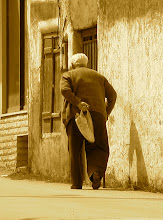
("My God, what a terrible programme"; "Sorry, force of habit.")
I remember years ago reading a series of novels by William Gibson and, even more recently, a series of novels by Richard Morgan. Both were set in bleak, post-apocalyptic dystopias featuring a cast of characters with extra-genetic modifications to their bodies enabling them to download tetrabytes of whatever directly into their brains (and so on and so forth...). They were the literary (superior) equivalents of 'Bladerunner', 'Matrix' and 'The Thirteenth Floor.' Well, it would be ridiculous to say that I'm still waiting...I live in Lebanon, where government-backed monopolies and corrupt network administration mean that I can't even get a decent internet connection most of the time. The two (two!) mobile phone network providers have got the market sewn up, iPhones (if you can get them unlocked) can never be upgraded because they will freeze and so are little more than fashion accessories and, in terms of the internet, there is a plethora of pay-as-you-go options at $50 dollars a time (for 2GB at best), a handful of wi-fi hotspots around the capital (Beirut) but, with the regular electricity interruptions, maintaining a connection is fraught with difficulty.
I woke up this morning and the electricity was off (6.00-9.00, 9.00-12.00, 12.00-15.00, 15.00-18.00 are the cycles, and my building has no generator: I don't mind because at least that means one less machine pumping out unfiltered petrol fumes into the environment), so I had to content myself with reading a book until it came back on when I could check (in no particular order)
* The Guardian;
* this blog;
* my flickr page;
* my hotmail, gmail and work e-mail accounts;
* my Twitter page (together with Ninjalabz);
* Facebook;
* a collection of local newspapers, citizen journalist pages (Demotix, Now Public) and a few blogs.
which took time. The loudest noise in The Guardian (bye bye Copenhagen...) was being made about the success of a Facebook/Twitter campaign to get a particular song by a certain band into the 'Christmas Number 1' slot in the UK charts, solely in order to defeat another song/artist on the sole grounds that the latter was a 'manufactured' event created as a result of participating in some TV game show or other ('X Factor' or 'Britain's Got Talent' or whatever).
http://www.guardian.co.uk/music/2009/dec/20/rage-against-machine-christmas-number-1
Following it were several opinion pieces, an endless list of opinions on the subect, fact and counter-fact (Rage Against The Machine are also operating under Sony BMG so the villain of the piece, one Simon Cowell, will still make piles of cash/No he won't, he's a non-executive director, and anyway RATM will donate the proceeds to a homelessness charity....and so on). I then switched on the radio (BBC Radio Five Live), and it was the subject of conversation there also.
Meanwhile here in Lebanon, a Syrian bus carrying workers going back to Syria was this morning shot up and one passenger was killed, whilst a Cloud search on Ninjalabz revealed that the biggest story of the day was about the death of some actress or other.
Inbetween times, I had always wondered why Twitter was not so popular in Lebanon as Facebook (with some honourable exceptions). It is, of course, to do with what people use it for; I have noticed that, in Greece, Twitter is a great way of organising demos, providing information about the location of riot police and so on during said demos, publishing real-time photos and links; Facebook, on the other hand, and to quote the satirist Jeremy Hardy, "is the modern equivalent of sorting out your sock draw" - it tells me who is, and is not, happy about the snow, the weather in general, their impending new baby, whether they had a good time last night, where they will be meeting up for a night out, and how many presents they have received on 'Farmville' or who they are playing online poker with. Most of all, probably, Twitter just doesn't allow people to post photographs of themselves at last night's party or to go on and on about how happy or not they are. After all, 160 characters just doesn't cut it, does it?
I suspect that, if Gibson and Morgan were to write their novels now, they wouldn't be full of surreptitious references to Baudrillard and Sadie Plant and Slavoj Zizek; instead, we'd all be wearing dark glasses with the Facebook 'live feed' being projected behind our retinas, and the National Inquirer entertainment section being fed into our cerebral cortex.




